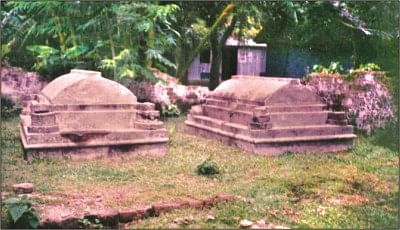In focus
Fading memories of Ustad Alauddin Khan in Shibpur
Sheikh Md. Shahidul Islam, B'baria
Places and edifices, holding memories of Sur Samrat Ustad Alauddin Khan, are in shambles at his native village in Shibpur, Brahmanbaria.A family mosque and decorated graves of Ustad Alauddin Khan's father Ustad Sabdar Hossain Khan and mother Sundari Begum at Shibpur are near ruination. The maestro's home now remain uncared for. After dusk the place takes the appearance of a ghost abode, as there is no electricity. Neither government nor any social, cultural or non-governmental organisation has come forward, as of yet, to preserve the ancestral home of Ustad Alauddin, said discontented locals. There is a music institute -- Sur Samrat Ustad Alauddin Sangitangan -- on the property but due to financial constraints the institute cannot sustain. Although the local people have established a college at the village in 1995 as a tribute to the legendary musician, due to lack of patronage it is not running smoothly either. In the late '80s, the then Deputy Commissioner of Brahmanbaria made plans to set up a complex, including a music school, a library, an auditorium and other facilities, at Shibpur village to honour the maestro. However, that plan was never materialised. Last year the 32nd death anniversary (November 6) of the maestro was observed at Nabinagar Upazila Press Club where the speakers collectively declared the main road of Nabinagar Pourasabha as Ustad Alauddin Road. Ustad Alauddin Khan was born at Shibpur village in 1862. Initially he trained under his elder brother Ustad Fakir Aftab Uddin Khan. Alauddin Khan also received music lessons from Gopal Krishna Bhattacharya, noted music exponent and composer of Calcutta, for seven years. Khan took lessons on flute, sitar, mandolin, shanai, and violin from Amritalal Dutta in Calcutta. He studied music composition under Ustad Ahmad Ali Khan. By 1918, he was a court musician at Darbar House of the then King of Maihar (India). He received several prestigious awards including Sangeet Academy Award (1952), Padma Bhusan (1958), Vishwa Bharati (1961), and Padma Vibhushan (1971). He created several original ragas including Arjun, Bhagabati, Bhim, Bhuvaneshvari, Chandika, Dhabalashri, Dhankosh, Dipika, Durgeshvari, Gandhi, Gandhi Bilawal, Haimanti and more. On November 6 in 1972, Ustad Alauddin Khan breathed his last in Maihar, India. He was buried there but his childhood memories are ingrained at his native village in Shibpur. If the concerned authorities take proper initiative, Shibpur can be turned into a significant tourist attraction and that would be a befitting tribute to the maestro.
|

Uncared for graves of Ustad Alauddin Khan's parents |